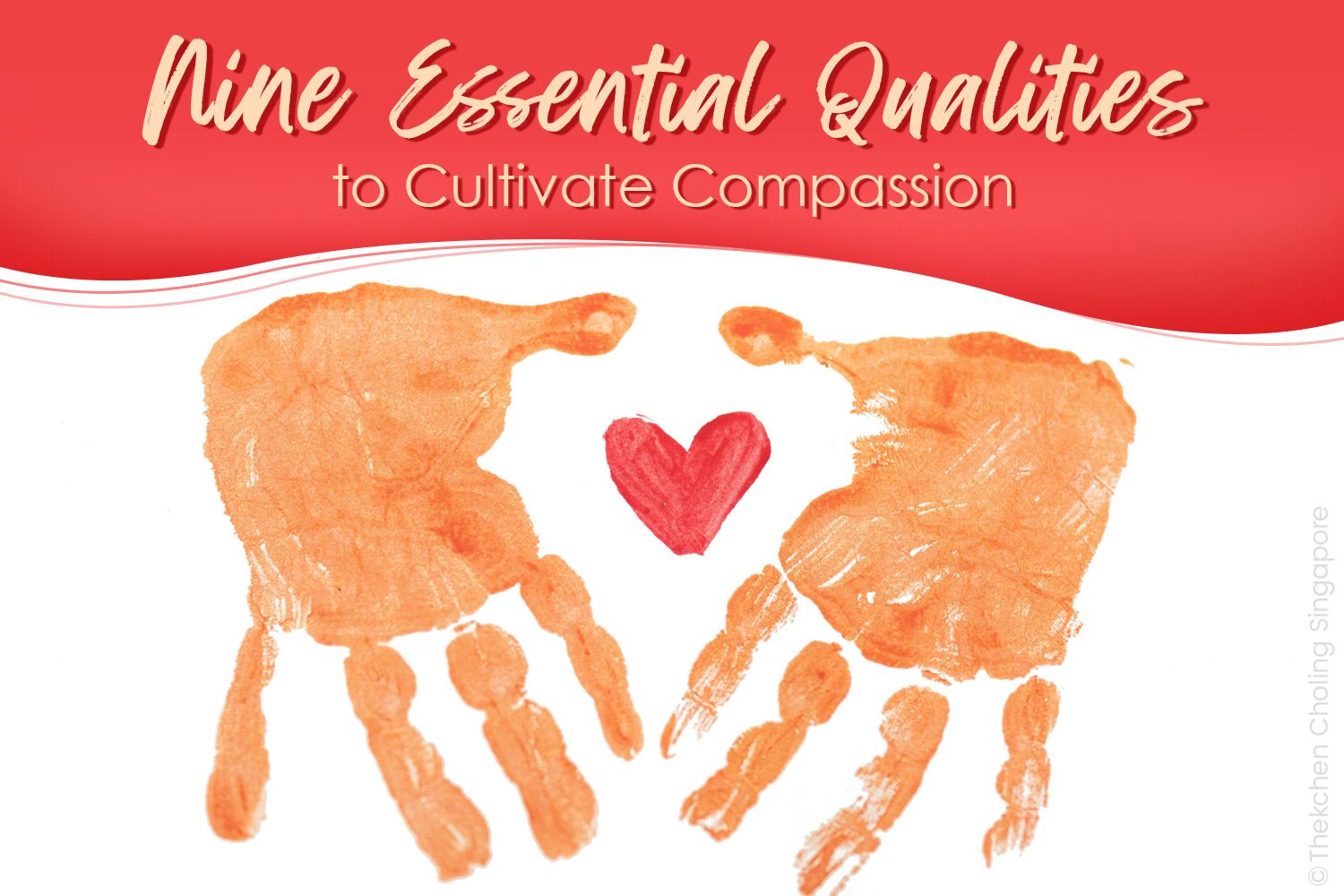Nine Essential Qualities to Cultivate Compassion

Compassion is one of the core immeasurable qualities in Buddhism, and yet it is often misunderstood as a simple feeling of pity or concern.
True compassion is far deeper, demanding both inner transformation and consistent practice. It is not merely a fleeting emotion but a profound expression of life itself. Mindrolling Jetsun Khandro Rinpoche, a well-known teacher in the Vajrayana Buddhist tradition, offers a beautiful teaching on compassion, outlining nine essential qualities. These qualities are referred to as the “nine expressions” of life which serve as guiding principles for embodying a genuinely compassionate heart.
1. Being Delightful
The first quality is being delightful, which might sound lighthearted, but in practice, it is about cultivating gentleness. Compassion cannot coexist with harshness or aggression; one cannot sincerely wish well for all beings while projecting ferocity. A compassionate person carries a gentle demeanor in speech, actions, and attitude. This gentleness is accompanied by a genuine delight in being of service, a heartfelt pleasure in alleviating the suffering of others. Compassion begins with a soft, open heart, welcoming others with warmth rather than fear or rigidity.
2. To Have Courage
Closely linked to delightfulness is the second quality: courage. True compassion demands bravery, which is the courage to move beyond self-centered fears, hesitations, and expectations. Often, helping others requires stepping out of comfort zones, confronting difficult truths, or acting against personal interests. Compassion calls us to transcend self-cherishing ambitions, placing the welfare of others above our own convenience. It is in these courageous acts, small or great, that compassion is truly generated.
3. Being Pleasant
The third quality is being pleasant, reflecting approachability and openness. A compassionate person is accessible, creating a welcoming space where others feel seen and understood. This pleasantness is not superficial charm but the result of self-awareness and emotional maturity. By understanding oneself, one can more freely and genuinely connect with others, offering comfort and kindness without barriers.
4. To Have Discipline
Yet, being delightful, courageous, and pleasant is not sufficient on its own. The fourth quality, discipline, ensures that compassion is sustained and consistent. Compassion is not a one-off reaction but a deliberate, ongoing practice. Discipline manifests as diligence, determination, and unwavering motivation to act for the benefit of all beings, day after day, regardless of circumstance or personal gain.
5. To Be Joyful
The fifth quality, joyfulness, adds lightness to compassionate action. Joyfulness involves finding happiness in the well-being of others without attachment or expectation. A joyful heart rejoices in the happiness of others simply because they are happy, and it consistently seeks to alleviate suffering wherever possible. This quality prevents compassion from becoming burdensome, transforming it into an uplifting, life-affirming force.
6. To Have Sternness
The sixth quality, sternness, may seem counterintuitive but is crucial. Sternness in compassion is about exercising wise discernment, even if it means saying “no” when necessary. It guards against “idiot compassion,” where kindness is offered without consideration of the greater good. True compassion requires clarity, wisdom, and sometimes firm boundaries, ensuring that our actions genuinely benefit others rather than merely comforting ourselves or enabling harmful patterns.
7. To Have Utter Kindness
The seventh quality, utter kindness, deepens this practice even further. It calls for complete selflessness in compassion, free from personal ambition, hidden agendas, or the desire for recognition. Utter kindness is pure and unconditional, aimed solely at alleviating the suffering of others, regardless of what one gains in return.
8. Going Beyond Hesitation
The eighth quality, beyond hesitation, reflects the need for decisiveness in compassionate action. Cultivating compassion involves thoughtful consideration, but once the path is clear, one must act without delay. Courage enables us to overcome habitual patterns of self-protection, fear, or doubt, allowing compassion to manifest fully in the moment.
9. Being Unbiased
Finally, the ninth quality is being unbiased. Compassion must be evenly distributed, not favoring those we like or those who meet our expectations, nor disproportionately directed at strangers while neglecting those close to us. True compassion sees all beings as equally deserving of care and concern, applying love and understanding impartially. This quality reminds us that cultivating compassion is not about selective kindness but about embracing a universal perspective of care and empathy.
Conclusion
Together, these nine qualities of delightful, courageous, pleasant, disciplined, joyful, stern, utterly kind, beyond hesitation, and unbiased—form the nine expressions of life. In Eastern traditions, they are mirrored in art, music, and dance, symbolising the vibrant, multifaceted nature of human life. Within the context of compassion, they become a framework for living with purpose, integrity, and heart-centered awareness.
Cultivating these qualities transforms every aspect of life. Every moment, whether filled with joy or sorrow, solitude or connection, success or challenge, becomes an opportunity to practice compassion. It is a continual process of aligning one’s inner life with the aspiration: “May others be free from suffering and the causes of suffering.” In this way, compassion is not just an abstract ideal but a lived experience, a guiding light for navigating the complexities of human existence.
Ultimately, the practice of the nine expressions of compassion is a path of both heart and wisdom. It teaches that compassion is as much about inner cultivation as it is about outer action. By embodying delightfulness, courage, pleasantness, discipline, joyfulness, sternness, utter kindness, decisiveness, and impartiality, we move closer to a life in which compassion is not an occasional act but the natural rhythm of our being. It is through this holistic approach that compassion becomes truly immeasurable, touching every facet of life and extending toward all sentient beings.
To listen to more Dharma teachings on how to cultivate compassion, do keep a lookout for teachings by Singha Rinpoche happening weekly. Follow our Telegram channel here to keep updated!

